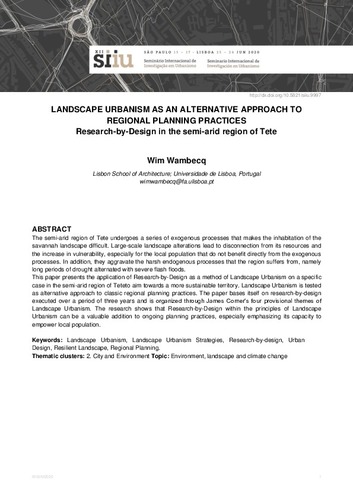Mostra el registre d'ítem simple
Landscape urbanism as an alternative approach to regional planning practices: Research-by-Design in the semi-arid region of Tete
| dc.contributor.author | Wambecq, Wim |
| dc.coverage.spatial | east=33.593831062316895; north=-16.154748668589; name=N7, Tete, Moçambic |
| dc.date.accessioned | 2021-02-02T08:42:10Z |
| dc.date.available | 2021-02-02T08:42:10Z |
| dc.date.issued | 2020-06 |
| dc.identifier.citation | Wambecq, W. Landscape urbanism as an alternative approach to regional planning practices: Research-by-Design in the semi-arid region of Tete. A: Seminario Internacional de Investigación en Urbanismo. "XII Seminario Internacional de Investigación en Urbanismo, São Paulo-Lisboa, 2020". São Paulo: Faculdade de Arquitetura da Universidade de Lisboa, 2020, DOI 10.5821/siiu.9997. |
| dc.identifier.issn | 2604-7756 |
| dc.identifier.uri | http://hdl.handle.net/2117/336602 |
| dc.description.abstract | The semi-arid region of Tete undergoes a series of exogenous processes that makes the inhabitation of the savannah landscape difficult. Large-scale landscape alterations lead to disconnection from its resources and the increase in vulnerability, especially for the local population that do not benefit directly from the exogenous processes. In addition, they aggravate the harsh endogenous processes that the region suffers from, namely long periods of drought alternated with severe flash floods.This paper presents the application of Research-by-Design as a method of Landscape Urbanism on a specific case in the semi-arid region of Teteto aim towards a more sustainable territory. Landscape Urbanism is tested as alternative approach to classic regional planning practices. The paper bases itself on research-by-design executed over a period of three years and is organized through James Corner’s four provisional themes of Landscape Urbanism. The research shows that Research-by-Design within the principles of Landscape Urbanism can be a valuable addition to ongoing planning practices, especially emphasizing its capacity to empower local population. |
| dc.description.sponsorship | This work has been financed by Fundação para a Ciência e Tecnologia, supported by the Portuguese Government through the Ministério da Educação e Ciência and by the European Union (Doctoral grant SFRH/BD/129670/2017) |
| dc.format.extent | 28 p. |
| dc.language.iso | eng |
| dc.publisher | Faculdade de Arquitetura da Universidade de Lisboa |
| dc.publisher | Universidade Presbiteriana Mackenzie de São Paulo |
| dc.publisher | Pontifícia Universidade Católica de Campinas |
| dc.publisher | Grup de Recerca en Urbanisme de la Universitat Politècnica de Catalunya |
| dc.publisher | Academia de Escolas de Arquitectura e Urbanismo de Língua Portugues |
| dc.relation.ispartof | Seminario Internacional de Investigación en Urbanismo (12è: 2020: São Paulo, Lisboa) |
| dc.rights | Attribution-NonCommercial-NoDerivatives 4.0 International |
| dc.rights.uri | https://creativecommons.org/licenses/by-nc-nd/4.0/ |
| dc.subject | Àrees temàtiques de la UPC::Urbanisme |
| dc.subject.lcsh | Sustainable urban development -- Mozambique |
| dc.subject.lcsh | Regional planning -- Mozambique |
| dc.subject.other | Landscape Urbanism |
| dc.subject.other | Landscape Urbanism Strategies |
| dc.subject.other | Research-by-design |
| dc.subject.other | Urban Design |
| dc.subject.other | Resilient Landscape |
| dc.subject.other | Regional Planning |
| dc.title | Landscape urbanism as an alternative approach to regional planning practices: Research-by-Design in the semi-arid region of Tete |
| dc.type | Conference report |
| dc.subject.lemac | Desenvolupament urbà sostenible -- Moçambic |
| dc.subject.lemac | Ordenació del territori -- Moçambic |
| dc.identifier.doi | 10.5821/siiu.9997 |
| dc.description.peerreviewed | Peer Reviewed |
| dc.rights.access | Open Access |
| dc.date.updated | 2021-02-02T08:42:10Z |
| local.citation.contributor | Seminario Internacional de Investigación en Urbanismo |
| local.citation.pubplace | São Paulo |
| local.citation.pubplace | Lisboa |
| local.citation.publicationName | XII Seminario Internacional de Investigación en Urbanismo, São Paulo-Lisboa, 2020 |


